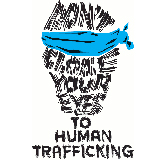Human Trafficking
Human trafficking is a form of slavery. It’s a crime and a human rights violation. And it’s happening in Ireland. Let’s end it now. Be vigilant: call 1800 25 00 25 or email blueblindfold@garda.ie
- What is it?
- Where does it happen?
- Ireland’s response
- What you can do to help
- Contact details
What is it?
What is it?
Trafficking
Trafficking takes place when all of these three elements are present:
- ACT – a person is recruited, transported, transferred, harboured or received
- MEANS – a person is threatened, forced or coerced in some way, through abduction, fraud, deception, the abuse of power or of a position of vulnerability or through the giving or receiving of payments
- EXPLOITATION – a person is exploited (ie sexual exploitation, labour exploitation, organ removal or exploited into criminal activities or forced begging)
Where does it happen?
Where does it happen?
Trafficking is happening worldwide and it also exists in Ireland. People can be trafficked into different types of work including:
- restaurant and hotel work
- domestic work
- construction
- agriculture
- entertainment
- prostitution
- other forms of commercial sexual exploitation
- criminal activities
- forced begging
Ireland’s response
Ireland’s response
Legislation
The Criminal Law (Human Trafficking) Act 2008 and the Criminal Law (Human Trafficking)(Amendment) Act 2013 are the primary legislation that deal with human trafficking in Ireland. Under these Acts, courts can impose penalties of up to life imprisonment and unlimited fines on those convicted of trafficking people for labour or sexual exploitation, removing a person's organs, forced criminality or forced begging.
European legislation
Ireland meets our obligations under Directive 2011/36/EU on preventing and combating trafficking in human beings and protecting its victims, through the two main Acts as mentioned previously. Further information on the legislation that supports Ireland's anti-trafficking policy can be found on the national anti-trafficking website, www.blueblindfold.gov.ie
A victim of trafficking can stay in Ireland for 60 days of recovery and reflection, even if they have no legal right to remain in the country.
This can be followed by a six-month renewable temporary residence permission where they want to help An Garda Síochána or other authorities in any investigation or prosecution relating to their alleged trafficking.
Anti-Human Trafficking Unit
The Anti-Human Trafficking Unit in the Department of Justice and Equality. This has both a co-ordinating and implementation role in relation to the State's response to trafficking in human beings. A key function of this Unit is to assist in resolving any issues which may arise between State agencies providing services to victims
Support for victims
Ireland has put in place a National Referral Mechanism, which covers all aspects of victim support from the initial encounter to finding longer-term solutions. Ireland has put in place a National Referral Mechanism, which covers all aspects of victim support from the initial encounter to finding longer-term solutions. Details of victim services, specialised units and the National Referral Mechanism can be found on the dedicated Anti Human Trafficking website www.blueblindfold.gov.ie
Awareness and training
A number of awareness raising and training activities have taken place to increase awareness of human trafficking. Visit the Blue Blindfold anti-human trafficking campaign website for more details.
What you can do to help
What you can do to help
Know the signs
An important part of the fight against human trafficking is making sure you’re aware of the signs of trafficking. A person who is trafficked will generally meet more than one of the signs and your vigilance could save someone one day.
Report your suspicions
If you suspect someone is a victim of trafficking, contact Crimestoppers on 1800 25 00 25 or email blueblindfold@garda.ie. If you feel that someone is in immediate danger, please call the local Gardaí immediately on 112 or 999.
Contact details
Contact details
Anti-Human Trafficking Unit
Department of Justice and Equality
51 St Stephen’s Green
Dublin 2
D02 HK52
Phone: + 353 1 602 8878
Fax: + 353 1 602 8276
Email: ahtu_inbox@justice.ie
Blue Blindfold campaign
For further information on human trafficking, visit the dedicated website: www.blueblindfold.gov.ie

